|
|
 |
|
Calanoida ( Order ) |
|
|
|
Lucicutiidae ( Family ) |
|
|
|
Lucicutia ( Genus ) |
|
|
| |
Lucicutia longiserrata (Giesbrecht, 1889) (F,M) | |
| | | | | | | Syn.: | Leuckartia longiserrata Giesbrecht, 1892 (p.359, 367, 773, Descr.F, figs.F);
Lucicutia simulans Sars, 1920 c (p.11); 1925 (p.216, figs.F,M); Farran, 1926 (p.278, figs.F,M); Rose, 1933 a (p.195, figs.F,M); Sewell, 1948 (p.503, 509); C.B. Wilson, 1950 (p.257); Grice, 1963 a (p.496); Djordjevic, 1963 (p.576); De Decker & Mombeck, 1964 (p.13); El-Maghraby, 1965 (p.54, Appendix); Mazza, 1966 (p.71); Vinogradov, 1968 (1970) (p.268); Dowidar & El-Maghraby, 1970 (p.268); Kovalev & Shmeleva, 1982 (p.84); Licandro & Icardi, 2009 (p.17, Table 4); Hidalgo & al., 2010 (p.2089, Table 2);
no Lucicutia longiserrata : Sars, 1925 (p.220); Rose, 1933 a (p.195, figs.F,M); ? Jespersen, 1934 (p.105); ? Mazza, 1962 (p.339); Grice, 1963 a (p.496); Grice & Hülsemann, 1965 (p.224); ? Mazza, 1966 (p.71) | | | | Ref.: | | | Giesbrecht & Schmeil, 1898 (p.112, Rem. F); Farran, 1908 b (p.64, figs.F, Rem.); A. Scott, 1909 (p.127, Rem.); Wolfenden, 1911 (p.323); Jespersen, 1934 (p.105); Tanaka, 1963 (p.32, figs.F,M); Hülsemann, 1966 (p.723, figs.F,M, Rem.); Heptner, 1971 (p.126, 127); Chihara & Murano, 1997 (p.830: tab.5); Lapernat, 1999 (p.22, 55, fig.F); Bradford-Grieve,1999 b (p.101, figs.F,M, Rem., figs.177, 191); Boxshall & Halsey, 2004 (p.133: F; p.135: M); Vives & Shmeleva, 2007 (p.338, figs.F,M, Rem.) | 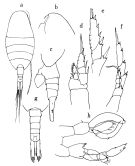 issued from : O. Tanaka in Publs Seto Mar. Biol. Lab., 1963, XI (1). [p.33, Fig.163]. Female: a, habitus (dorsal); b, forehead (left lateral side); c, last thoracic segment and urosome (left lateral side); d, P1; e, exopod of P2; f, P5. Nota: The urosome segments and furca in the proportioal lengths as 31:10:10:17:32 = 100. The furcal rami 4-times as long as is wide at the proximal. Male: g, urosome (dorsal); h, P5. Nota: The urosome segments and furca in the proportioal lengths as 13:13:13:9:14:38 = 100.
|
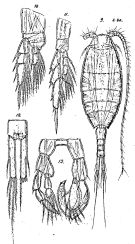 Issued from : G.O. Sars in Résult. Camp. Scient. Prince Albert I, 69, pls.1-127 (1924). [Pl.LVIII, figs.9-13]. As Lucicutia simulans. Female: 9, habitus (dorsal); 10, P1; 11, P5; 12, anal segment and caudal rami (dorsal). Male: 13, P5.
|
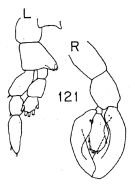 Issued from : K. Hülsemann in Bull. Mar. Sc., 1966, 16 (4). [p.728, Fig.121]. Male: 121, P5. L= left leg; R = right leg.
|
 Issued from : K. Hülsemann in Bull. Mar. Sc., 1966, 16 (4). [p.722, Fig.86]. Female: 86, P5.
|
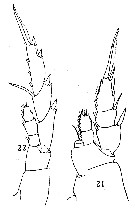 issued from : G.P. Farran in Fish. Ire. Sci. Invest., 1906, II [1908]. [Pl. VI, Figs.21-22]. Female (from 53°7'N, 15°6'W): 21, P1; 22, P5. Nota: The tubular basal process of P1 is not so long as shown in Giesbrecht's figure.
|
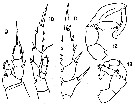 issued from : G.P. Farran in Biscayan Plankton collected during a Cruise of H.M.S. 'Research', 1900.- Part XIV. The Copepoda. (Linn. Journ. Zoology, XXXVI, 1926). [p.304, Pl.9, Figs.9-13]. As Lucicutia simulans. Female: 9, P1; 10, P5; 11, P2. Male: 12, right P5; 13, left P5.
|
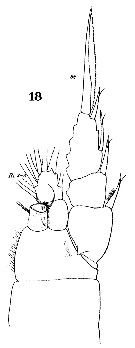 Issued from : W. Giesbrecht in Systematik und Faunistik der Pelagischen Copepoden des Golfes von Neapel und der angrenzenden Meeres-Abschnitte. - Fauna Flora Golf. Neapel, 1892. Atlas von 54 Tafeln. [Taf. 19, Fig.18]. As Leuckartia longiserrata. Female: 18, P1 (anterior view). St = terminal spine; Ri 2-3 = endopodal segment 2-3.
|
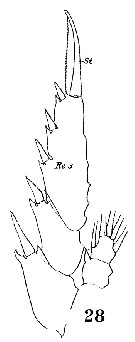 Issued from : W. Giesbrecht in Systematik und Faunistik der Pelagischen Copepoden des Golfes von Neapel und der angrenzenden Meeres-Abschnitte. - Fauna Flora Golf. Neapel, 1892. Atlas von 54 Tafeln. [Taf. 19, Fig.28]. As Leuckartia longiserrata. Female: 28, exopod and endopod of P2.
|
 Issued from : W. Giesbrecht in Systematik und Faunistik der Pelagischen Copepoden des Golfes von Neapel und der angrenzenden Meeres-Abschnitte. - Fauna Flora Golf. Neapel, 1892. Atlas von 54 Tafeln. [Taf. 19, Fig.25]. As Leuckartia longiserrata. Female: 25, P5. Si = inner spine; Se = outer spine; Re 3 = exopodal segment 3.
|
 Issued from : W. Giesbrecht in Systematik und Faunistik der Pelagischen Copepoden des Golfes von Neapel und der angrenzenden Meeres-Abschnitte. - Fauna Flora Golf. Neapel, 1892. Atlas von 54 Tafeln. [Taf. 19, Fig.1]. As Leuckartia longiserrata. Female: 1, 4th segment of A1 (ventral view). Aes = aesthetasc; Sdi = distal spine; Spr = proximal spine.
|
 Issued from : W. Giesbrecht in Systematik und Faunistik der Pelagischen Copepoden des Golfes von Neapel und der angrenzenden Meeres-Abschnitte. – Fauna Flora Golf. Neapel, 1892, 19 , Atlas von 54 Tafeln. [Taf.38, Fig. 36]. As Leuckartia longiserrata. Female: 36, urosome (ventral).
|
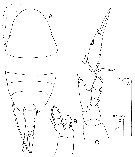 issued from : J.M. Bradford-Grieve in The Marine Fauna of New Zealand: Pelagic Calanoid Copepoda. National Institute of Water and Atmospheric Research (NIWA). NIWA Biodiversity Memoir, 111, 1999. [p.103, Fig.67, A-C]. Female (28°52'S, 178°054E)): A, habitus (dorsal); B, P1; C, P5.
|
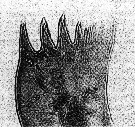 issued from : P.E. Lapernat & C. Razouls in Vie Milieu, 2002, 52 (1). [p.21, Pl. II, fig.3]. Masticatory edge of Md gnathobase female (from off Malta, Mediterranean Sea).
|
 Lucicutia longiserrata Lucicutia longiserrata female: 1 - Characters following not combined : Prosome about 3 times longer than urosome. Cephalosome with slightly projecting and rounded anterior corners and well developed lateral spinous projections; anal somite about as long as wide; caudal rami 11.7 times longer than wide and bowed outwards at base, leaving elliptical space between rami proximally. 2 - P1 with 2-segmented endopod. 3 - Cephalosome not with 2 pairs of lateral spinous projections, but with other forms. 4 - A1 extending to end of caudal ramus or 1 to 2 segments beyond. 5 - Caudal rami 3 to 4 times longer than wide. 6 - Terminal setal element of P5 a little shorter than 3rd exopodal segment.
|
 Lucicutia longiserrata Lucicutia longiserrata male: 1 - P1 with 2-segmented endopod; 2 - Caudal rami less than 10 times longer than wide. 3 - Inner distal corner of basis of P5 without strong spine. 4 - Basis of left P5 ornamented differently from L. oblonga. 5 - Caudal rami about 3 to 5 times longer than wide. 6 - A1 reaching beyond tip of caudal rami by 2 segments; inner distal corner of basis of left P5 produced, ornamented with 2 or 3 teeth, 1 small seta and a rounded process.
| | | | | Compl. Ref.: | | | Massuti Alzamora, 1942 (p.111); C.B. Wilson, 1950 (p.256); Grice, 1963 a (p.496); Furuhashi, 1966 a (p.295, vertical distribution in Kuroshio region, Table 9); Mazza, 1967 (p.367); Grice & Hulsemann, 1967 (p.17); Vinogradov, 1968 (1970) (p.268); Park, 1970 (p.477); Roe, 1972 (p.277, tabl.1, tabl.2); Björnberg, 1973 (p.343, 387); Deevey & Brooks, 1977 (p.256, tab.2, Station "S"); Vaissière & Séguin, 1980 (p.23, tab.2); Kovalev & Shmeleva, 1982 (p.84); Vives, 1982 (p.293); Scotto di Carlo & Ianora, 1983 (p.150); Scotto di Carlo & al., 1984 (1041); Roe, 1984 (p.358); Lozano Soldevilla & al., 1988 (p.59); Pancucci-Papadopoulou & al., 1990 (p.199); Scotto di Carlo & al., 1991 (p.270); Shih & Young, 1995 (p.70); Lapernat, 2000 (tabl.3, 4); Lapernat & Razouls, 2001 (p.123, tab.1); Holmes, 2001 (p.17); Weikert & al., 2001 (p.229, fig.7, Rem.); Koppelmann & Weikert, 2007 (p.266: tab.3); Gaard & al., 2008 (p.59, Table 1, N Mid-Atlantic Ridge); Licandro & Icardi, 2009 (p.17, Table 4); Mazzocchi & Di Capua, 2010 (p.426); Medellin-Mora & Navas S., 2010 (p.265, Tab. 2); Brugnano & al., 2012 (p.207, Table 2, 3); El Arraj & al., 2017 (p.272, table 2); Belmonte, 2018 (p.273, Table I: Italian zones) | | | | NZ: | 13 + 1 doubtful | | |
|
Distribution map of Lucicutia longiserrata by geographical zones
|
| | | | | | | | | | | | | Loc: | | | South Africa (E), Cape Verde Is., off NW Cape Verde Is., off Mauritania, off Moroccan Atlantic Coast, off Madeira, Azores, off W Cape Finisterre, Bay of Biscay, off Portugal, E Caribbean, Caribbean Sea, Caribbean Colombia, G. of Mexico, off Bermuda (Station "S"), Sargasso Sea, ? Strait of Davis S, off W Ireland, Ibero-moroccan Bay, Medit. (NW Basin, G. of Lion, off Monaco, Ligurian Sea, Tyrrhenian Sea, Strait of Messina, off Malta, Adriatic Sea, Ionian Sea, Lebanon Basib, Egypt coast, Alexandria), Indian, Indonesia-Malaysia, Philippines, China Seas (South China Sea), off Taiwan, Japan, Marshall Is., Pacif. ( E & SE ), Chile (N-S), off New Zealand (NE, NW) | | | | N: | 42 | | | | Lg.: | | | (1) F: 2,4; (21) F: 3-2; M: 2,5-1,9; (24) F: 3; (26) F: 2,52; M: 1,88; (38) F: 2,82-2,64; M: 2,52; (47) F: 2,2; (199) F: 2,58-2,05; M: 2,28-1,82; (340) F: 2,6-2,25; (909) F: 2,2-2,6; M: 1,9; {F: 2,00-3,00; M: 1,82-2,52} | | | | Rem.: | Bathypelagic (epipelagic in A. Scott, 1909; meso-bathypelagic in Roe, 1972; 1984). Sargasso Sea: 500-2000 m (Deevey & Brooks, 1977, Station "S") 369-1236 m at Station T-1 (E Tori Is., E Japan).
As a consequence of the synonymies, the correct geographic distribution of this species is difficult to establish.
For Hülsemann (1966, p.723) the description of the species Sars described (1920, 1925) under the name L. simulans appears to be identical with that of L. longiserrata (Giesbrecht, 1888). Sars' (1925) identification of L. curta as L. longiserrata was corrected by Tanaka (1963). Possibly the specimens reported by Mazza (1962) as L. longiserrata are also L. curta; unfortunately, the illustrations are inconclusive.
After Lapernat & Razouls (2002, p.19) the Itoh's index value = 577.7 (number of teeth: 11).
The synonymy between L. simulans and L. longiserrata is not admitted by Walter & Boxshall (2011) in the World Copepoda database. | | | Last update : 24/10/2022 | |
|
|
 Any use of this site for a publication will be mentioned with the following reference : Any use of this site for a publication will be mentioned with the following reference :
Razouls C., Desreumaux N., Kouwenberg J. and de Bovée F., 2005-2025. - Biodiversity of Marine Planktonic Copepods (morphology, geographical distribution and biological data). Sorbonne University, CNRS. Available at http://copepodes.obs-banyuls.fr/en [Accessed January 01, 2026] © copyright 2005-2025 Sorbonne University, CNRS
|
|
 |
 |















